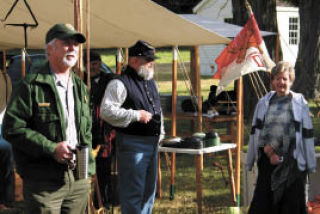The National Park Service’s 10th annual “Encampment” at English Camp is July 26-27.
The date was incorrect in Wednesday’s Journal.
Encampment brings together historical re-enactors from the United States and Canada to teach, celebrate and practice what life was like for the men and women who lived at American Camp and English Camp during the 12 years of the joint occupation.
“We come together and celebrate peace,” Park Ranger and Historian Mike Vouri said.
In the so-called Pig War, the only shot fired in anger was the one that Lyman Cutlar fired in killing a pig owned by Hudson’s Bay Company. The event brought the U.S.-British territory dispute into sharp focus.
American and British troops were garrisoned at American Camp and English Camp, respectively, while governments took their time deciding who the San Juan Islands actually belonged to. In the end, it was Germany’s Kaiser Wilhelm I that made the decision that the archipelago was to be American soil, whereupon the British moved their troops off the island in short order and the case was closed.
Encampment started in 1998 when, through the graciousness of the British government, money was found to replace the aging 80-foot flagpole with a new one. When the British asked Vouri how they should mark the occasion, Vouri thought it would be appropriate to do what the soldiers and marines did during the occupation: throw a party.
“It was perfect,” Vouri said. “The British thought it was a great idea.” The idea caught on and the event has been a high point in the National Park’s event calendar.
“What people like most about Encampment are the people doing the re-enactments,” Oren Combs said. Combs is a long-time member of Battery D, a group of local volunteers who act as American soldiers of the period. “The camps are very authentic. People can move from tentsite to tentsite, talking with the living-history people. They love it.”
Volunteers arrive in period costume and talk to visitors in the first person, telling visitors what it was like 150 years ago. Want to see how a blacksmith made tools and horseshoes to order from scratch? No problem. Local smiths will be on hand with a portable, vintage forge. What was the food like? Visitors will find out.
Re-enactors from Canada visit each year in correct Royal Marine Light Infantry and Royal Navy uniforms and show visitors what life was like as a young man in the Queen’s Service. Members of San Juan Island’s Battery D will do the same, only dressed as Americans. It stays true to the same sort of camaraderie and generosity the two forces showed each other during the Pig War, when the Americans would routinely march up to Garrison Bay where the British were stationed and mark holidays and important events by getting together and throwing a party.
For Battery D, familiar to islanders during parades and ceremonies, the event is their highlight, for they get to do much more than march. Members will be on hand to show visitors skills used daily in the course of soldiering. They play vintage instruments and live for the weekend as the soldiers would have, on the ground in rustic tents.
Highlights of this year’s event, which is free to the public, include Vouri’s well-known theater monologue, “The Life and Times of General George E. Pickett.” With the help of musical historian and folklore expert Michael Cohen, Vouri’s monologue traces the development of tensions with Great Britain in the crucial early months of the standoff. Vouri and Cohen will perform July 25, 8 p.m., in the San Juan Community Theatre.
There will be a black powder demonstration at English Camp on Saturday and Sunday, 11 a.m. and 2 p.m. Doug Halsey, an expert at historical arms, will be up from Fort Vancouver to demonstrate how the old rifles were used. No live rounds will be fired.
Encampment has its own version of the popular Food Network show, “Iron Chef,” called the “Cast Iron Cookoff,” hosted by local actor, playwright and historian Chris DeStaffany.
“It’s a lot of fun,” Vouri said. “The cooks use period ingredients, many of them local. Two cooks, each with an assistant prepare a full meal in a matter of 40 minutes.” The outcome is judged, Vouri said, by volunteers willing to taste whatever comes off the fire, in whatever condition it reaches them.
Hours for Encampment follow the regular park hours of 8:30 a.m. to 5 p.m., although exceptions are made for the culminating event of the weekend: the Candlelight Ball.
One of the barracks still standing at English Camp was the designated place for social and community functions for the 12 years of the original encampment. Each year, the building is dressed out in all its best period finery and guests come dressed in costume to perform a true-to-the-time dance. Visitors can come too, dressed in clothes of their own choosing.
“It’s really beautiful,” Vouri said. “The inside and outside of the building is lit up by candles and lamplight. It’s a really beautiful event.”
For more information on Encampment, visit www.nps.gov/sajh/, or call 378-2902. For information on “The Life and Times of General George E. Pickett,” contact the San Juan Community Theatre box office at 378-3210.



